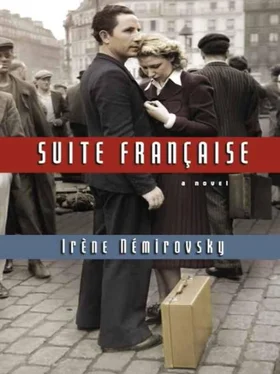Further away, shadowy figures wandered past. You could just about make out a pale bodice, a ribbon in flowing hair, a shiny boot or belt buckle. The guard was still marching up and down in front of the Lokal, which it was forbidden to approach upon pain of death, but his comrades were enjoying their free time and the beautiful night. Two soldiers were singing amid a group of young women-
Trink'mal noch ein Tröpfchen!
Ach! Suzanna…
– and the young women softly hummed along.
During a moment of silence, Madame Angellier and the Viscountess heard the final notes of the song.
"Who could be singing at this hour?"
"They're women with German soldiers."
"How revolting!" the Viscountess exclaimed. She made a gesture of horror and disgust. "I'd really like to know who those shameless girls are. I'd make sure the priest knew their names." She leaned forward and eagerly peered out into the night.
"I can't make them out. They wouldn't dare in broad daylight. Oh, ladies, this is worse than everything! Now they're corrupting Frenchwomen! Just think of it, their brothers and husbands are prisoners and they're out having a good time with the Germans! What's come over these women?" the Viscountess cried, indignant for many reasons: wounded patriotism, a sense of propriety, doubts about her influence in society (she gave lectures every Saturday night on "How to be a true Christian woman"; she had founded a local library and she sometimes even invited the local young people to her home to watch informative, edifying films such as A Day at Solesmes Abbey, or From Caterpillar to Butterfly. And for what? So that everyone would have a horrible, debased idea of Frenchwomen?). Finally, she was angry because she had a passionate nature that was troubled by certain stirring images. Yet she knew there was no hope of the Viscount satisfying her, since he had little interest in women in general and her in particular.
"It's scandalous!" she exclaimed.
"It's sad," said Lucile, thinking of all the girls whose youth was passing them by in vain: the men were gone, prisoners or dead. The enemy took their place. It was deplorable, but no one would even know in the future. It would be one of those things posterity would never find out, or would refuse to see out of a sense of shame.
Madame Angellier rang for the cook, who came in and closed the shutters. Everything withdrew back into the night: the songs, the murmur of kisses, the soft brightness of the stars, the footsteps of the conqueror on the pavement and the sigh of the thirsty frog praying to the heavens for rain, in vain.
The German and Lucile ran into each other once or twice in the dimly lit entrance hall. When she took her garden hat down from its peg on one of the antlers, she knocked against a decorative copper plate on the wall and made it jingle. The German seemed to listen for this faint sound in the silent house. He would go to the door to help Lucile, offering to carry her basket, her secateurs, her book, her embroidery, her deckchair into the garden. But she no longer spoke to him. Instead, she thanked him with a nod of the head and a forced smile; she thought she could sense Madame Angellier lying in wait behind the shutters to spy on her. The German understood and kept to himself. He went out with his regiment on manoeuvres almost every night; he never returned until four o'clock in the afternoon and then shut himself in his room with his dog. While walking through the village in the evening, Lucile sometimes saw him sitting alone in a café, reading a book, with a glass of beer in front of him. He avoided acknowledging her and would turn away, frowning. She was counting the days. "He'll be leaving on Monday," she said to herself. "By the time he gets back, his regiment may have already left. Anyway, he's understood I won't speak to him any more."
Every morning she asked the cook, "Is the German still here, Marthe?"
"Well, yes," the cook would say. "He doesn't seem so bad: he asked if Madame would like to have some fruit. He'd be happy to give us some. Good grief, they want for nothing, them! They've got crates of oranges. So refreshing…" she added, torn between a feeling of kindness towards the officer who offered her fruit and who always behaved, as she put it, "very nice, very kind; he doesn't scare you," and another feeling, a surge of anger when she thought of all the French people who couldn't get any fruit at all.
This last thought was undoubtedly the stronger. "Still, they're a rotten lot, they are!" she finally said in disgust. "I take whatever I can get from that officer, I do: his bread, his sugar, the cakes he gets from home (made with the best flour, I can tell you, Madame), and his tobacco that I send to my prisoner of war."
"Oh, you shouldn't, Marthe!"
But the old cook just shrugged her shoulders. "Since they take everything from us, it's the least…"
One evening, just as Lucile was leaving the dining room, Marthe opened the kitchen door and called out, "Could you please come in here, Madame? There's someone who wants to see you."
Lucile went in, afraid of being seen by Madame Angellier, who didn't like anyone to go into the kitchen or the larder. Not that she seriously believed Lucile would steal the jam, despite ostentatiously inspecting the cupboards in front of her, but rather because she felt the same sense of intrusion an artist feels when interrupted in his studio, or a socialite in front of her dressing table: the kitchen was a sacred domain that belonged to her and her alone. Marthe had been with her for twenty-seven years. And for twenty-seven years, Madame Angellier had gone to great lengths to make sure Marthe never forgot she wasn't in her own home, and that at any moment she could be forced to leave her feather dusters, her pots and pans, her stove; just as the devout must remember that, according to the rituals of the Christian religion, worldly possessions are granted only temporarily and can be taken away overnight on a whim of the Creator.
Marthe closed the door behind Lucile and said reassuringly, "Madame is at church."
The enormous kitchen was as big as a ballroom, with two large windows that opened out on to the garden. A man was sitting at the table. Lucile saw that a magnificent pike, its silvery body trembling in its final death throes, had been thrown on to the oilcloth, between a large loaf of bread and a half-empty bottle of wine. The man raised his head; Lucile recognised Benoît Sabarie.
"Where did you get that, Benoît?"
"In Monsieur de Montmort's lake."
"You'll get caught one of these days."
The man didn't reply. He lifted up the enormous fish by the gills; it flicked its transparent tail, now barely breathing.
"Is it for us?" asked Marthe, who was related to the Sabaries.
"If you want."
"Give it to me, Benoît. Do you know, Madame, that they're cutting back the meat rations again? It'll be death and the end of the world," she added, shrugging her shoulders while hanging a large ham from the joists. "Benoît, since Madame isn't home, tell Madame Gaston why you've come."
"Madame," said Benoît with difficulty, "there's a German at our place who's chasing after my wife. The Commandant's interpreter, a nineteen-year-old kid. I can't take it any more."
"But how can I help?"
"One of his friends is living here…"
"I never speak to him."
"Don't give me that," said Benoît, looking up.
He went over to the stove and absent-mindedly bent the poker, then straightened it again; he was extraordinarily strong.
"You were talking to him in the garden the other day, laughing with him and eating strawberries. I'm not criticising you, it's your business, but I'm begging you. Get him to talk to his friend so he sees reason and gets himself somewhere else to live."
Читать дальше

![Константин Бальмонт - Константин Бальмонт и поэзия французского языка/Konstantin Balmont et la poésie de langue française [билингва ru-fr]](/books/60875/konstantin-balmont-konstantin-balmont-i-poeziya-francuzskogo-yazyka-konstantin-balmont-et-thumb.webp)










